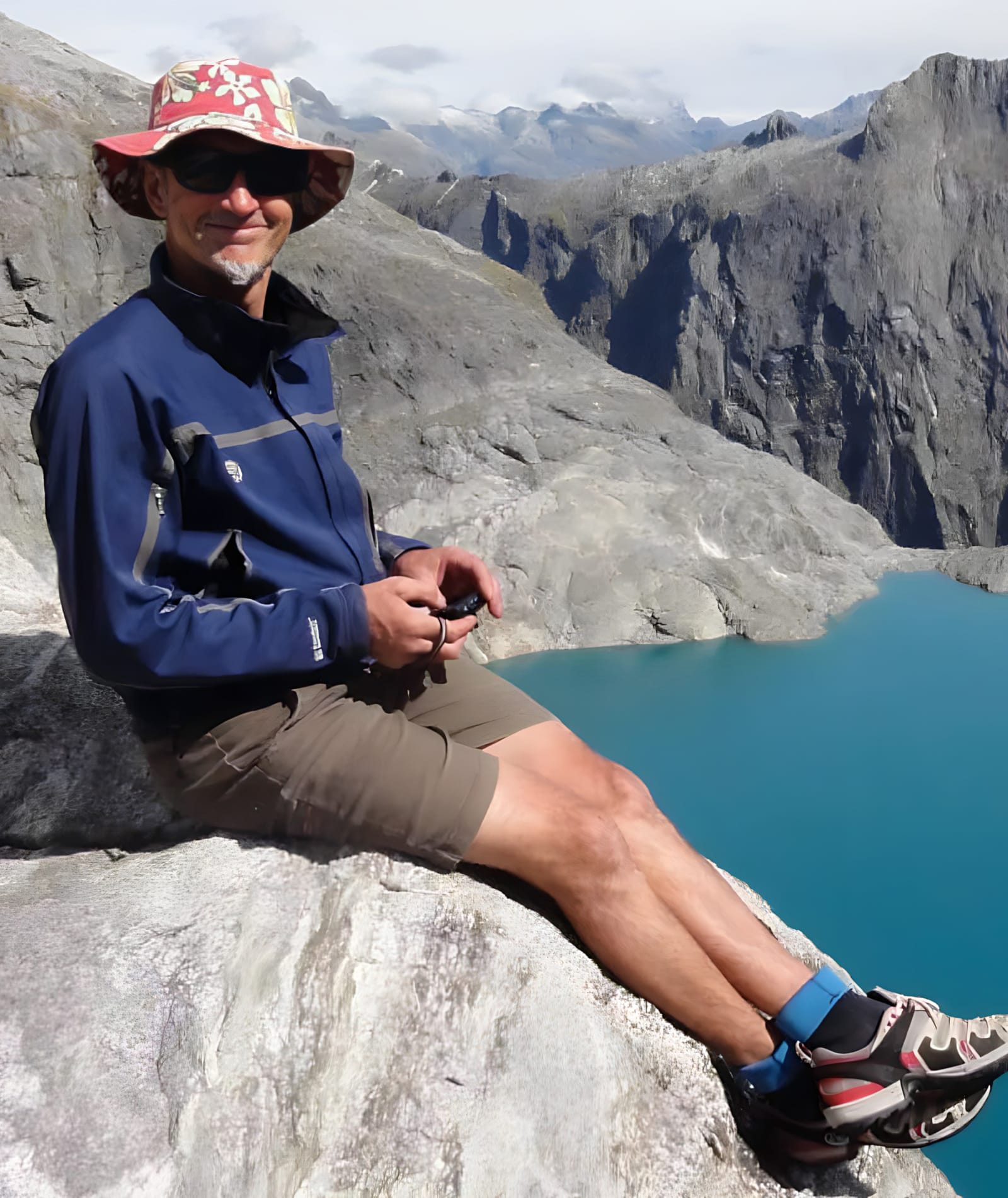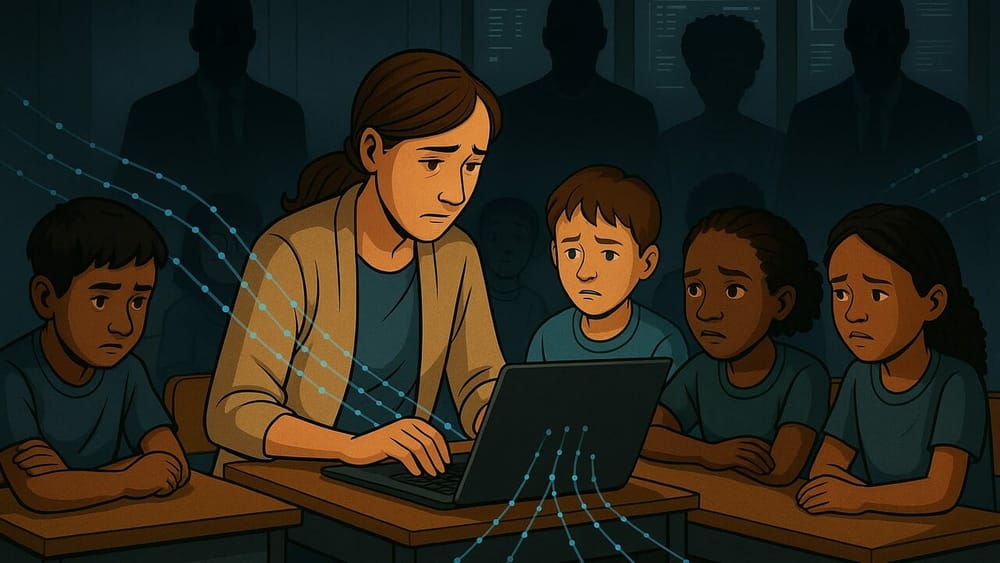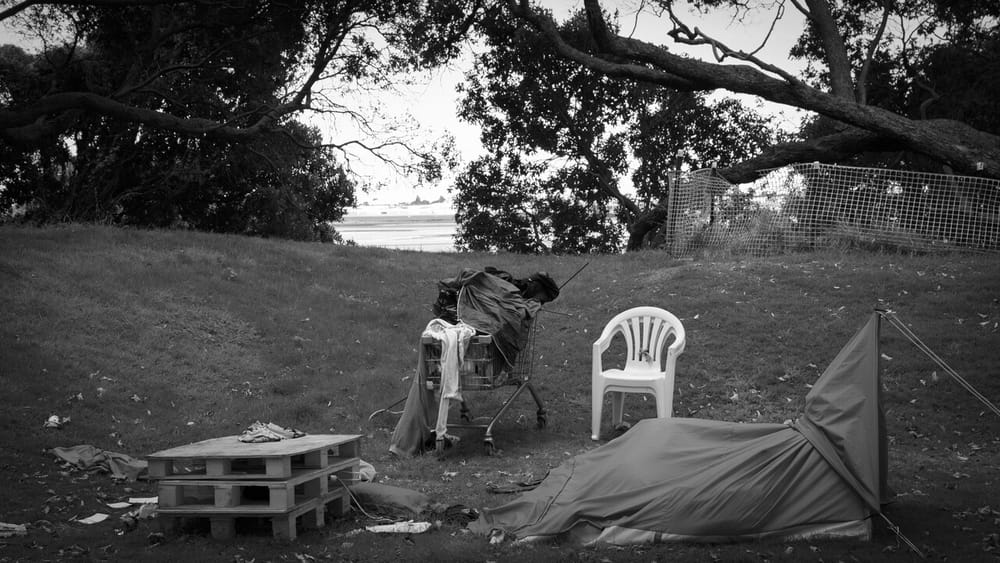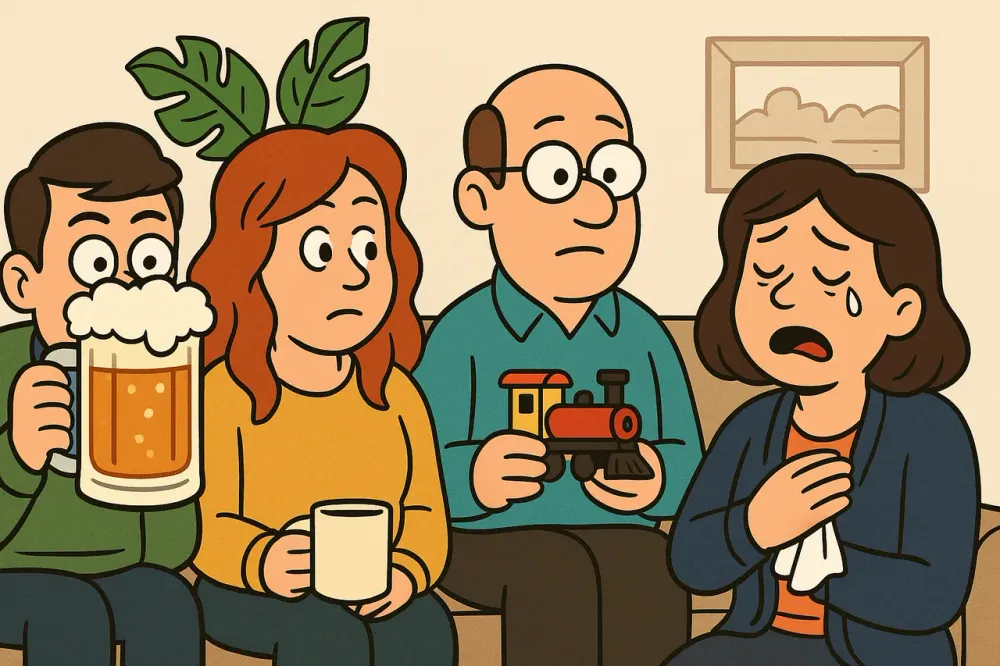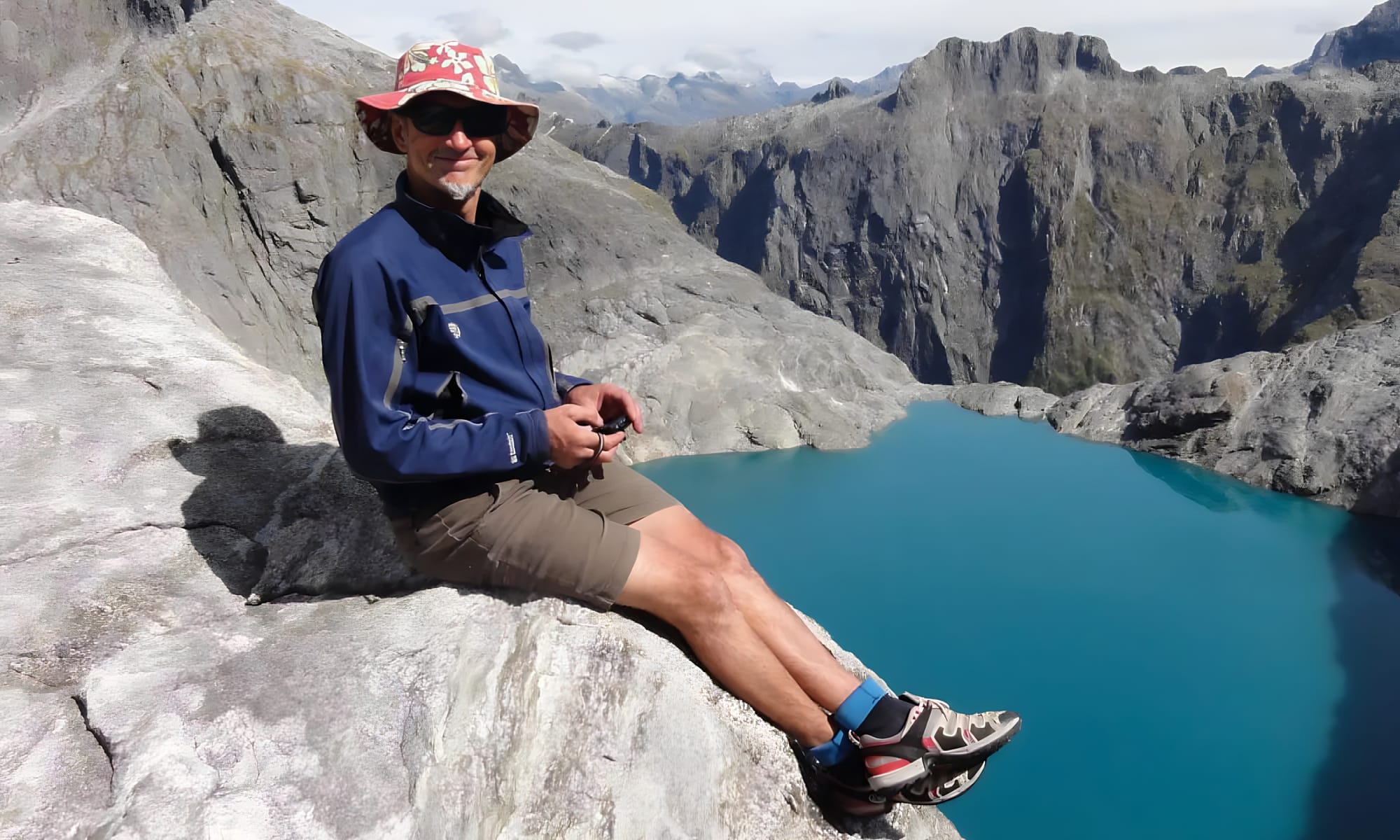
Dave Vass loved his life as the co-owner of Deep Canyon in Wanaka. Outdoor adventuring was his work and his pleasure. That ended in a single moment, when a fall in the Darran mountains of Fiordland broke his neck in 2015. Left with only the partial control of his left arm, Vass would henceforth experience the world very differently.
How does a person begin to push past despair and learn to live fully in such new circumstances? In the week that his book Not Set In Stone was due to be published, Vass spoke with The Lovepost to reflect on the two distinct phases of his life.
He recalls his instant realisation that his neck was broken, the night-long wait for rescue, and the years-long process of re-imagining life and redirecting his energy. With his new master's degree in creative writing and some surprising writing projects that need finishing, Vass’s adventures continue.
Thanks so much for speaking, Dave. I'm sure that many of our readers will know your name but please, would you start by telling us about the life you thought you would lead and how that changed?
Oh, I was already leading the life I thought I'd lead, which was based around the mountains and adventure and the outdoors in the South Island. My partner and I owned a tourism business down in Wanaka around canyoning. We did a lot of wide ranging activities, from climbing through to free diving. Definitely getting out there. I was a pretty keen explorer within those fields, pushing where those things can go a wee bit. Where I lived in Wanaka—it's something of a hotbed, I guess, for that sort of thing. So you're surrounded by a lot of like-minded people and fabulous places to go and things to discover and explore. I was out there doing it. Going quite swimmingly until then, so [laughs].
How long did you lead that adventurous life?
That was my business that I'd set up with my partner. And we set that up around the mid-90s, we started doing that. Companies started doing it. And then, although that was a business, we were also keen to go exploring in canyons because honestly, they're amazing venues to go to. It's really exciting. But I sort of eased out. I was doing more climbing. And then, before I hurt myself, I'd been spending lots of time in the ocean, diving in particular. So yeah, [that’s] kind of my progression—mountains to the sea.
It was about eight years ago, so 2015. So when it happened, it was the big end of a really big, long day in the mountains. I was with a group of friends in Fiordland and we were at the end of a 10-day trip. We were exiting the mountains in a really full-on storm and I fell down a bank, landed on my head, and it broke my neck—which was actually quite a quick and simple thing to do, as it turns out. And I knew straight away that I'd done it. There's a massive crunch and I couldn't speak, or move, or make much noise, or anything really. I don't know, I just instantly knew what had happened.
Instantly—did you sort of know what the diagnosis would be, or did you just know that something was very wrong?
Pretty much. No, I think you know. I've had kind of a reasonable amount of first-aid training. I don't know, when you're a bit crunched in the back of your neck and you can't move, you just sort of know. Just lying down, face-first in a muddy puddle of water in the forest and unable to even lift my head out of it. Yeah, I think I knew.
[W]e were there . . . it took all night. We were rescued, or I was rescued. It was quite a big night. It was tough for my friends to get me through the night, but we were rescued. Right through that whole time, I was pretty sore and knew what was going on.
All night – that is just so hard to imagine. How was everyone reacting, not only you but the rescue team and the people around you? Was it cool, calm and collected; getting you out of there? Or a bit of chaos?
I just went totally within myself really, for long periods of the night. I drifted in and out of consciousness, and all that sort of stuff. You have to talk to my friends about that. They were pretty cool, calm and collected I suppose, and they got me through it but there was quite a lot of survival going on.
And after that, I don't really remember, I mean, I do remember the next few weeks in intensive care. It was months after that in the spinal ward, and my attitude changed. Everybody was, to start with, dumbstruck that it had happened . . . It was a real shock and it takes a while, and everyone deals with that change in their own ways, some better than others. Pretty up and down.
Can you talk through the general process of recovery? Was there ever a chance for a full recovery?
You measure spinal injuries by the level of injury in the spine. So mine was C-4, so that's quite high. That's a complete injury. The spinal cord is effectively severed, or so damaged that there's nothing going on below that level. And that would have meant that I was able to shrug my shoulders maybe and breathe, but only just. And all the rest of my body would be unconnected. And that's actually how it was for a few weeks.
And because [the spinal injury] was incomplete . . . there is a chance that I would recover, but they never give you a prognosis because they don't know. And so you just have to give it a go. Do what you can to encourage recovery. And they tell you that that . . . as a rule, happens within a two-year period after a spinal injury, which is about right for me. Maybe a bit longer. And I spent that time pretty intensively trying to get better. And yeah, most of the assistance that I had through that time is definitely focused on physical recovery.
And did you experience much recovery during that time?
Oh, yeah. [But much of it] stopped after three years.
[The New Zealand Accident Compensation Corporation or ] ACC has a slightly arcane assessment process whereby you have an interview and show people what you can do, and they take points off for what you can't do. They assess your percentage of disability, you know—a hundred percent being dead, I suppose. And I was assessed at 76 percent disabled. Which I thought was a bit low, personally. But anyway, they give you more money if you're over 80, so I figured they made it slightly less than it was.
But I'm around that sort of level of doing. I have a left hand that I can use—my left arm is about 70 percent good—but my right arm is pretty useless. I can stand up in a standing frame and hold my weight on one hand. I can move around a bit. And I can drive a car, actually. It's a specially adapted car with hand controls. I can do that. If I was much more injured, I wouldn't be able to. I must be on the cusp of everything. But it's great. I mean, now I can actually do a reasonable amount.
I imagine it’s very important that you feel a sense of autonomy.
Yeah, that's key, that whole independence because, you know, I've lived a life of being pretty physically able—just doing stuff all the time, and all [of a] sudden you just can't get anywhere. And it's very frustrating. And so, to get some of [that] back and be able to do things, even if . . . you can't do the same things—accepting that—but finding the things that you can do, finding what you need to help you do things. Whether it's technology—technology is a good one. I've got some pretty high-tech bits of equipment that help me out. They're great. Yeah, and finding the right sort of people to be around and support you through it.
When you understood that this accident would be life-changing, there must have been impossible moments.
There is an instant realisation but it takes you quite a long time to come to actual terms [with] what it really means. And, also because you're always slowly getting better, you're always very focused on that, and you're quite hopeful that you're going to improve. Which I was, but slowly, you know, spending seven or eight months in the spinal ward. And you really only stay there that long if you are improving over that time. You get very focused on it.
And you're right, actually. Because there was quite a time after that . . . probably four years before I finally admitted to myself I wanted to get better. And there was quite a period of time where we were like, 'Right, this is it. This is where I'm at physically.' And I think it was a year or two at least, where I was really kind of in this zone of not knowing where else to go—which was, in retrospect . . . a bit dumb. I mean, I've still got my mind. And I can say, 'I'm going to give up some physical things, and just use my mind.'
But to actually take that on board and actively search for things for your mind to do, and make a life out of that. It took me a long time to actually get into the groove of realising that. But that's just kind of what I've done.
Was there a moment when you were ready to imagine a good life in different terms? Did it just click for you all of a sudden or was it a slow, gradual realisation?
There was very little in the way of clicking [laughs]. That's just for me; it might have clicked for some people. No, it was totally gradual. Because you're giving away a lot as you find... for me, it was really finding something. [You’ve] just got to look for something that might grab your attention, or might spark a bit of joy, and follow it and see if it takes you somewhere. It's like you're looking from the beginning again. It's quite a different thing. You know, normally, your life develops and builds on something else. But actually, it's like beginning all the time. Sometimes surprising, and it probably takes a while.
Was that search an open, shared process of finding your spark, or were you keeping your emotions to yourself?
No, there's no keeping that to yourself [laughs]. But I reckon there's a lot of crying going on. That's for sure. A lot of gnashing of teeth and a bit of depression that you go through. Well, I went through all that stuff.
Well, I came to a stage where I just got so sick of being miserable. You've got to make a decision about it. You really go, 'Well, I can either stay miserable or I can do something to not be miserable.’
You've got two options here. One of them is killing yourself. And the other one is just doing something that might create some change and looking around and finding something—and if you find something, follow it for a bit. See how it goes. It might not work but you know, there's got to be something.
I think, this classic thing of dragging yourself out of depression? [I think those are the] first steps. And once you start doing that, you've only got to find something that gives you a spark of joy. Well, maybe if there's that little bit, then there might be another thing down the road somewhere—after doing writing, for example, I really enjoyed that—and off you go.
Is that your approach to life now? You find those moments and follow them.
Yeah. It's something that I make a point of—putting effort into new things. Because it worked for me. I'm in a good place now. And I wasn't, and it really was just that process of hunting around, finding something and pursuing it. Saying, 'Oh, well maybe that thing over there—I can try that.' A few dead ends, things that didn't work out. But yeah. I've also adopted this new attitude, and it's actually been quite good.
You were a person who pushed yourself. You took physical risks. Does the same character still shape your work and your interests?
Well, I think I've almost become a bit more adventurous really, in some ways. Well, physical adventures is one thing but then, putting your writing out there. That's a whole other thing, putting yourself out there into the public eye and having people read your stuff and review it or like it or not—you know, it's quite daunting. Maybe, I suspect, it probably has helped with the fact that I've taken a few risks before, and they've paid off [laughs].
What are your techniques for staying mentally strong? Is this a priority for you?
Yes, I suppose it is. Probably the distraction technique, you might want to call it [laughs]. Well, you know, it's just finding something that brings you joy and following whatever that might be. There are a few things that have interested me lately, but writing in particular.
I still have lots of things that I still need to physically sort out. Support, work and a place to live. But, if you put enough time into the thing that you love, it's enough. I mean, you can't do that all the time but if you do it enough, I reckon that's all you need.
You've also gone back to school and gotten a master's degree in creative arts.
Yeah, an MA in creative writing, last year.
Will you continue to write or do you have something else in the tank?
Well, the MA is based on a portfolio. You write a folio and you get assessed on it. So I've got that sitting there, burning a wee hole in my brain lately as to what I'm going to do with it. Because I do quite like it.
The book that I'm just about to get published is the main one. I like to think it is sort of a pretty interesting memoir that delves off in various directions. But this [other] one started off as kind of the memoir part two. You know, my relationship with nature has been kind of completely severed, really, in the way that I used to do things. So I've had to find new ways to relate to nature because I can't live without it. And it's occurred to me that everybody's actually in that position. We've all had nature taken away from us. And we've been separated from it in all sorts of different ways. Climate change is the upcoming biggie one.
Anyway, and [the writing] delved off into that through a disability lens, which—I wasn't quite sure what that meant, and I still don't quite know now. But it got me thinking around those issues quite a lot. And anyway, I ended up writing some speculative fiction to imagine the world where everyone had wheels instead of legs—a little bit out of hand, but yeah, I can just see lots of potential for that. I'm super keen to write around that sort of subject.
That sounds completely new! I’ve got a language question for you as a writer. Communities and individuals who live with disabilities hold strong and sometimes conflicting opinions about how we can best name them as whole people, while acknowledging how they experience the world. Our language begins to shape our thoughts about them.
Yeah, that's an interesting one. I did actually ponder that quite a bit last year.
Can you share your thoughts about how to name these differences and what the categories mean? For you, at least.
For me, at least, I totally embraced the whole ‘cripple’ thing for a while. I'm a cripple. And if you've seen it, there's a great documentary called Crip Camp. I think it's on Netflix. Look it up. And it's about this camp. It's in the States in the 70s, maybe the 60s even. And a summer camp was organised for people of all sorts of different disabilities, [coming] to this physical location in the woods. There was a big camp there and it was the spawning ground for a whole lot of disability activism stuff. But it was cool. Crip Camp, anyway. And reclaiming that word 'crip' is something that I kind of felt good about for a while. But I know other people don't, and other people wince when I use it. And that's just one example, I suppose.
I mean, language is important. It's the building blocks of our perception of each other. But I've never got too hot under the collar about definitions of how to describe disabled people. I mean, just the term ‘disability’ actually sticks them off a wee bit. But other times they go, 'Well, you know, people are just gonna start talking about it, and it's got to have some kind of name that people can swallow.' [laughs]
The name of my folio of work . . . was called DIS. It's a fractured love story, is what it was [laughs]. I can send you a picture of the cover. Yeah, so I have reflected on that, but I don't hold any particularly strong opinion about it.
How do you describe yourself? And, if you don't mind, why is that the right description for people to meet you?
How would I describe myself? I don't even really bother, you know—what, so I can try to describe to people that I'm in a wheelchair or something? I mean, I just don't bother telling them unless it's going to be an issue, really.
And then finally, your new book! How's that going? Are you enjoying the publicity and preparations for it to be published?
It was actually supposed to hit the shelves this week but the printer buggered it up. Made a mistake in the printing and had to reprint the entire run, so they can recall the whole run. So it's being added to the shelves next week apparently. It's called Not Set In Stone. It's mostly about adventuring and climbing, and a bit of my accident—how that first bit of that time changed.
I mean, I just started writing little stories. I think I started writing little stories about my adventures and my trips because I didn't want to forget them. I wanted to have something to hang on to. And then I started thinking more about now. I started the book probably four or five years ago and one thing led to another, and I had all sorts of thoughts to tie it all together. Anyway, the publisher seems to like it and decided to publish it, so great.
Congratulations! So then, what's next?
Well, I've been writing some short stories . . . but now my main one is I really want to carry on with my last years’ work. I feel I've got a bit more to say here, and I was having fun doing that, so yeah. It's a bit different writing it on my own, actually, after being in a class where you've got ten of you picking it apart, and picking at each others’ work. Being in a class is quite productive.
Yeah, you’ve got that sense of collaboration.
Yeah, it was great . . . to have a couple of trusted confidantes to share your stuff with. Well, it's been a bit of writing as therapy I suppose. Definitely writing the book was . . . [about] making sense of it all to myself.



